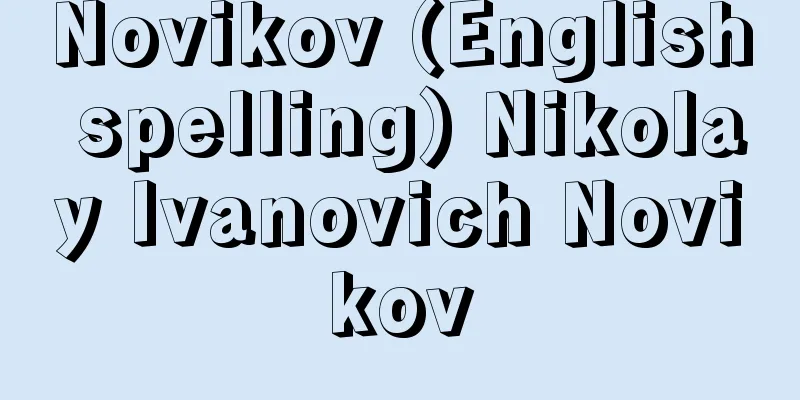Novikov (English spelling) Nikolay Ivanovich Novikov

|
A Russian satirist and journalist. Born into a poor noble family, Novikov was expelled from Moscow University's secondary school for absenteeism, after which he served briefly as a soldier and civil servant. He was briefly enrolled in the New Code Committee established by Catherine the Great, but retired from his official position after the committee was dissolved. From 1769 onwards, he published a series of magazines aimed at social satire and enlightenment, including "Dragon Bee," "The Slacker," and "The Painter." He wrote a great deal of articles exposing the contradictions of serfdom, using various pen names. Some of the magazines were discontinued within a short time, but Novikov's editorials, which included harsh content, had a great impact on the Russian reading community and laid the foundation for subsequent Russian criticism. In his magazine "Dragon Bee," he once had a fierce debate with Empress Catherine's magazine "All Things" over the corruption of government officials and their satirical attitude. In addition to his work as a magazine editor, he published the complete works of Sumarokov and Russian translations of works by Shakespeare and Rousseau. After joining the Freemasons in the 1770s, he became increasingly passionate about enlightenment activities, establishing schools, printing presses, hospitals, and other institutions, and also embarking on social activism. However, as his activities became more active, he came under suspicion of the Empress, and after his arrest he was imprisoned in the Shlisselburg Fortress Prison in 1792 without being put on trial. He was released in 1796 by Paul I, who succeeded the Empress. However, he was already a distant memory of his former self. [Nakamura Yoshikazu] [References] |Source: Shogakukan Encyclopedia Nipponica About Encyclopedia Nipponica Information | Legend |
|
ロシアの風刺作家、ジャーナリスト。貧しい貴族の出身で、モスクワ大学付属中学校を無断欠席のため放逐され、その後、軍人、役人として短期間勤務した。エカチェリーナ2世が設立した新法典委員会に一時籍を置いたが、この委員会の解散後官職を退き、1769年以降『雄蜂』『駄ぼら吹き』『画家』など社会風刺と啓蒙(けいもう)を目的とする雑誌を次々と刊行。自らさまざまな筆名を用いて農奴制社会の矛盾を摘発する記事を書きまくった。雑誌のなかには短期間に廃刊になったものもあるが、辛辣(しんらつ)な内容を含むノビコフの論説はロシアの読書社会に大きな反響をよぶとともに、その後のロシア評論の礎(いしずえ)を置くことになった。『雄蜂』誌上で、官吏の腐敗ぶりと風刺の態度をめぐって、エカチェリーナ女帝の雑誌『一切合切(いっさいがっさい)』と激しい論争を行ったこともある。雑誌編集者として活躍したほか、スマローコフ全集やシェークスピア、ルソーなどの作品のロシア語訳を刊行。1770年代にフリーメーソンに入会してからますます啓蒙活動に情熱を燃やし、学校、印刷所、病院などを設立し、社会運動にも乗り出した。しかし活動が盛んになるにつれて女帝の嫌疑を受け、逮捕ののち裁判にもかけられずに、1792年シュリッセリブルグの要塞(ようさい)監獄に投獄された。1796年女帝を継いだパーベル1世により釈放されたが、すでに往年のおもかげはなかった。 [中村喜和] [参照項目] |出典 小学館 日本大百科全書(ニッポニカ)日本大百科全書(ニッポニカ)について 情報 | 凡例 |
<<: Aleksei Silych Novikov-Priboi
Recommend
Spanish literature
This refers to literature written in Castilian/Sp...
Polish Peasant Party (Polish Peasant Party)
Abbreviation: PSL. A Polish political party. One o...
Horticulture
...Horticulture for the purpose of selling the pr...
Yokozeki
This is the name of a place in Gamo County, Omi Pr...
S wave - S is
Among seismic waves, this is one of the elastic bo...
Akagi [town] - Akagi
An old town in the southwest of Iishi County, cent...
névé (English spelling) neve
…This kind of snow has intermediate properties be...
Lagerstroemia speciosa (English spelling)
…[Yoshishige Tachibana]. … *Some of the terminolo...
Makinogoke - Makinogoke
A single genus and species of liverwort in the fam...
Kingdom of Colchis - Kingdom of Colchis
Colchis is the name given by the ancient Greeks to...
Meeting place - Kaishochi
...Many of them were tenement buildings, so they ...
Diet - Food
It refers to the habits of animals when they cons...
Ho Quy Ly (English spelling)
1336‐1407 Founder of the Ho Dynasty (1400-07) in V...
Night Attack - Yochi
(1) A form of battle in which an enemy castle, man...
Right to collective action - dantaikoudouken
One of the basic human rights of workers is to en...









